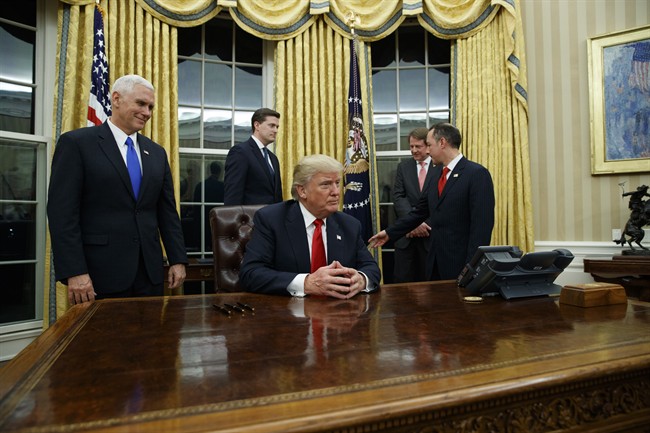Setting itself apart from a never-say-die Japan, Canada resigned itself to the death of the Trans-Pacific Partnership on Monday after President Donald Trump made good on his promise to pull the United States out of the trade pact.

Trump called getting out of the TPP “a great thing for the American workers” as he signed an executive order formally removing the U.S. from the controversial 12-country Pacific Rim deal.
There was no immediate comment from Prime Minister Justin Trudeau or Foreign Affairs Minister Chrystia Freeland, who are in Calgary for a two-day cabinet retreat where how best to deal with the Trump team is the main preoccupation.
Canada had been taking a wait-and-see approach to the TPP, with the Liberal government launching a sweeping consultation that appeared designed to postpone a decision until the U.S. resolved the question of whether or not to take part.
READ MORE: Top aide to Donald Trump plans talks in Canada with Justin Trudeau’s team, says source
Asked whether the government believes the deal can be salvaged, Freeland spokesman Alex Lawrence would only say, “The agreement cannot enter into force without the United States.”
Japan, however, continued to cling to the hope that there was room to salvage the deal by changing Trump’s mind.
“A TPP without the U.S. would be incredibly difficult, but we do have a window until 2018, when the treaty needs to be ratified,” Yoshihide Suga, a top adviser to Japanese Prime Minister Shinzo Abe, told American broadcaster CNBC.
“We believe we still have an opportunity to convince the U.S. about the importance of free trade.”

Get weekly money news
Abe has personally met Trump to push the merits of the deal. Japan has also urged fellow TPP countries, including Canada, to push Trump to reconsider.
That’s a message the Japanese reinforced earlier this month to the Liberal chairman of the House of Commons foreign affairs committee during his visit to Japan.
READ MORE: Donald Trump promises ‘massive’ tax cuts for middle-class, companies
Japan called on Canada and other countries to ratify the TPP in their respective parliaments “as soon as possible and have everybody on board, and through that have a form of pressure on the American administration,” Liberal MP Bob Nault said in a recent interview.
Canada has instead told Japan it would like to reopen talks on bilateral trade deal, Nault said.
Japan isn’t reopening any bilateral trade talks with TPP countries because that wouldn’t help it press its case with the new Trump administration.
Abe and Australian Prime Minister Malcolm Turnbull affirmed their support for the TPP during a Jan. 14 meeting, said Tony Negus, Australia’s high commissioner to Canada.
Negus said Monday Australia was disappointed by Trump’s decision.
WATCH: Donald Trump: We have to stop the horror known as Trans-Pacific Partnership

“Our view has always been that the TPP is a high-quality modern trade agreement that has commercial and strategic value for all 12 countries that signed up to it.”
One Canadian trade expert said Trump’s decision heralds more trouble on trade, including the North American Free Trade Agreement between the U.S., Canada and Mexico.
“It reflects a disdain for open markets and liberalized trading arrangements and the manifestation of Mr. Trump’s ‘America First’ policy,” Toronto trade lawyer Lawrence Herman said of the decision.
“It signals storm clouds ahead for the NAFTA. Canada needs to be prepared if the U.S. decides to pull the plug on that deal.”
It remains unclear if Trump would seek individual deals with the 11 other countries in the TPP, a group that includes Canada and represents roughly 13.5 per cent of the global economy, according to World Bank figures.
READ MORE: Timeline of Donald Trump’s 1st weekend as president: Missteps, two-steps and ‘alternative facts’
Canada’s trade department said in a study last year that the TPP would generate more than $4 billion in long-term GDP gains for the Canadian economy but would lead to the loss of $5 billion if it did not join the deal.
Canada’s participation in the TPP was cemented by the previous Conservative government two weeks before they lost power in the October 2015 federal election.
The incoming Liberals affirmed they, too, were ardent free traders, but said they wanted to consult widely before the deal was implemented. The Liberals have also said the TPP would not survive the withdrawal of the U.S.







Comments